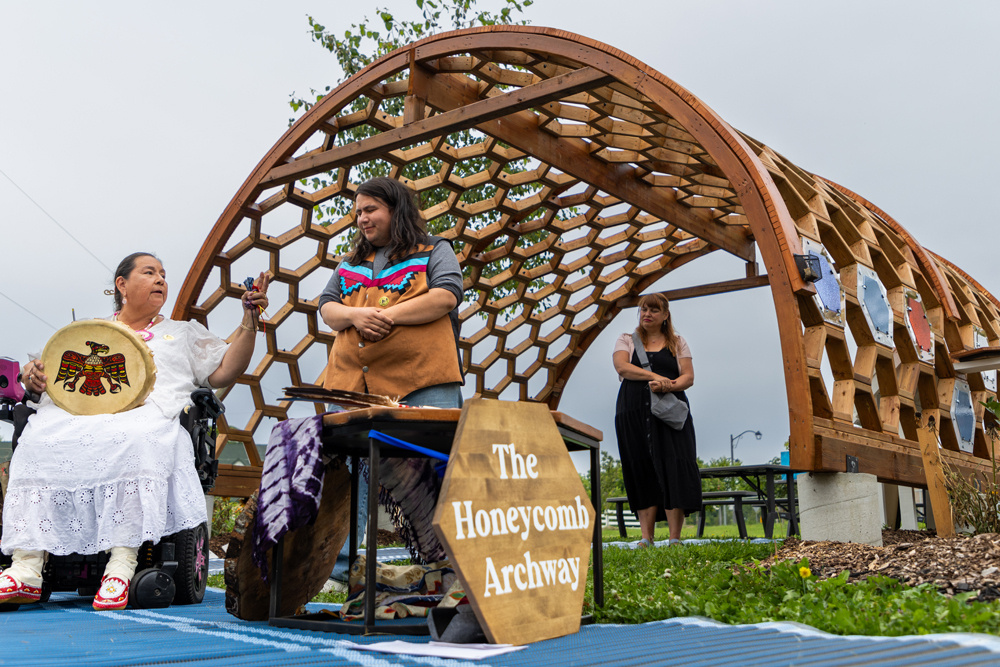
An innovative architectural placemaking project at Ontario Tech University's Windfields Farm Lands is using architectural design to reimagine an outdoor space into a gathering area and garden. The Honeycomb Archway project is an endeavour of Ontario Tech’s Office of Campus Infrastructure and Sustainability (OCIS), symbolizing the university’s ongoing commitments to innovative learning and reimagined teaching.
On August 6, a thank you ceremony was held at Windfields Farm Lands for partners, supporters and donors to the project, followed by a ribbon cutting ceremony to officially open Honeycomb Archway structure. The ceremony also included a visit from Elder Dorothy Taylor who shared in a smudging ceremony and reflected on Indigenous respect of “Mother Nature”, recognizing the project’s theme of reconciliation and the land around the archway being given back to nature.
Experiential learning and community engagement
OCIS and Unity Architects mentored three architectural technologist students from the Durham College Faculty of Science, Engineering and Information Technology throughout the construction and design of the archway, providing them with practical, hands-on architectural experiences crucial for their graduation requirements. OCIS and the students partnered with the University’s business start-up incubator and technological learning hub, the Brilliant Catalyst, supporting them with student funding, entrepreneurial skills development, and an experiential learning placement through the Experience Ventures program.
Design Elements and Themes
With a focus on reconciliation, sustainability and accessibility, the Honeycomb Archway design process involved feedback from a wide range of community partners, including Indigenous Peoples, local businesses, and government. The project was supported by community members for supplies, construction and engagement.
The archway is surrounded by a new community garden, contributing to the Ontario Tech University Pollinator Project, a part of the David Suzuki Foundation Butterflyway project, and extending programs like Bee City and the Library Seed Project. This introduction of new indigenous habitats bridges academia to nature and creates a space for learning about plants, bees, and small insects, and plays a significant role in creating a welcoming and sustainable campus environment. OCIS also partnered with Mobi-Mat to provide an accessible route around and through the structure during the thank you ceremony, ensuring everyone could enjoy access to the sculptures, plaques, and native plantings.
Community and financial support
The Honeycomb Archway project received substantial in-kind, material and financial support from various donors and organizations and Ontario Tech University would like to give gratitude for their valued commitment and support:
- Office of Campus of Infrastructure and Sustainability
- Butterflyway volunteers
- Peacock Lumber
- J.J.McGuire General Contractors
- Unity Architects
- AMR Engineering Limited (Structural Engineers)
- Wynn’s Property Maintenance
- Kingsway Garden
- Mobi-Mat and WAC-Watts Accessibility Consulting
- Ontario Tech’s Indigenization Community of Practice
- STEAM-3D Maker Lab
- Office of Student Life Indigenous Education and Cultural Services
- Ontario Tech University Advancement department
- Faculty of Engineering and Applied Science
- Brilliant Catalyst
- Campus Libraries Seed Program
- Mitch and Leslie Frazer Faculty of Education and TD Friends of the Environment Foundation
- Operation Ecopen
- Durham College Faculty of Science, Engineering, and Information Technology
Quote
“The Honeycomb Archway Project exemplifies the university’s dedication to community collaboration and innovative education, preparing students for a greener workforce and healthier communities through thoughtful architectural placemaking.”
-Deanna Young, Architectural Planner, Office of Campus Sustainability and Infrastructure













